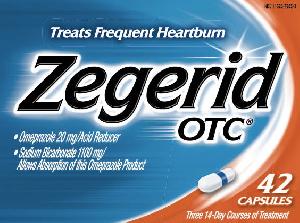Zegerid OTC Disease Interactions
There are 5 disease interactions with Zegerid OTC (omeprazole / sodium bicarbonate).
Alkalinizing agents (applies to Zegerid OTC) sodium/water balance
Major Potential Hazard, High plausibility. Applicable conditions: Congestive Heart Failure, Fluid Retention, Hypernatremia
Alkalinizing agents containing sodium can induce sodium and water retention and result in hypernatremia, hypokalemia, hyperosmolality, edema and aggravation of congestive heart failure. Therapy with sodium- containing alkalinizing agents should not be used in patients with hypernatremia or fluid retention. Clinical monitoring of acid/base balance and electrolytes prior to, during, a following completion of therapy with alkalinizing agents is recommended.
PPIs (applies to Zegerid OTC) C. diff
Major Potential Hazard, Moderate plausibility. Applicable conditions: Pseudomembranous Colitis, Diarrhea
Published observational studies suggest that proton pump inhibitor (PPI) use may be associated with an increased risk of Clostridium difficile-associated diarrhea (CDAD), especially in hospitalized patients. This diagnosis should be considered for diarrhea that does not improve. It is recommended that patients should use the lowest dose and shortest duration of PPI therapy appropriate to the condition being treated. Close monitoring is recommended in patients with diarrhea and in those taking antibacterial agents as CDAD has been reported with the use of nearly all these agents. Treatment with antibacterial agents alters the normal flora of the colon, leading to overgrowth of C. difficile. C. difficile produces toxins A and B, which contribute to the development of CDAD. Appropriate fluid and electrolyte management, protein supplementation, antibiotic treatment of C. difficile, and surgical evaluation should be instituted as clinically indicated.
Alkalinizing agents (applies to Zegerid OTC) acid/base balance
Moderate Potential Hazard, High plausibility. Applicable conditions: Renal Dysfunction, Alkalosis
Alkalinizing agents act as proton acceptors and/or dissociate to provide bicarbonate ions. Elimination of bicarbonate is decreased in patients with renal impairment and can result in metabolic alkalosis. Symptoms of metabolic alkalosis include hyperirritability or tetany, arrhythmia, and/or seizures (altered pH = altered calcium), or lactic acidosis due to impaired oxygen release. Therapy with alkalinizing agents should be administered with extreme caution in patients with compromised renal function. Clinical monitoring of renal function, acid/base balance and electrolytes is recommended.
Proton pump inhibitors (applies to Zegerid OTC) bone fractures
Moderate Potential Hazard, Moderate plausibility. Applicable conditions: Osteoporosis
Various published observational studies have reported that PPI therapy may be associated with an increased risk for osteoporosis related fractures of the hip, wrist or spine. The risk was increased in patients who received high doses (multiple daily doses), and long term treatment (a year or longer). Patients should use the lowest dose and shortest duration of PPI therapy appropriate to the condition being treated. Caution should be used in patients at risk for osteoporosis related fractures and should be managed according to established treatment guidelines.
Proton pump inhibitors (applies to Zegerid OTC) hypomagnesemia
Moderate Potential Hazard, Moderate plausibility. Applicable conditions: Magnesium Imbalance
Symptomatic and asymptomatic hypomagnesemia has been reported rarely in patients treated with PPIs for at least 3 months, in most cases after a year of therapy. Serious adverse events can include tetany, seizures, and arrhythmias. Caution should be used in patients prone to magnesium imbalances such as patients taking other medications that can cause hypomagnesemia (e.g., diuretics). Regular monitoring is recommended.
Zegerid OTC drug interactions
There are 304 drug interactions with Zegerid OTC (omeprazole / sodium bicarbonate).
More about Zegerid OTC (omeprazole / sodium bicarbonate)
- Zegerid OTC consumer information
- Check interactions
- Compare alternatives
- Reviews (7)
- Drug images
- Side effects
- Dosage information
- During pregnancy
- FDA approval history
- Drug class: proton pump inhibitors
Related treatment guides
Drug Interaction Classification
| Highly clinically significant. Avoid combinations; the risk of the interaction outweighs the benefit. | |
| Moderately clinically significant. Usually avoid combinations; use it only under special circumstances. | |
| Minimally clinically significant. Minimize risk; assess risk and consider an alternative drug, take steps to circumvent the interaction risk and/or institute a monitoring plan. | |
| No interaction information available. |
Further information
Always consult your healthcare provider to ensure the information displayed on this page applies to your personal circumstances.


